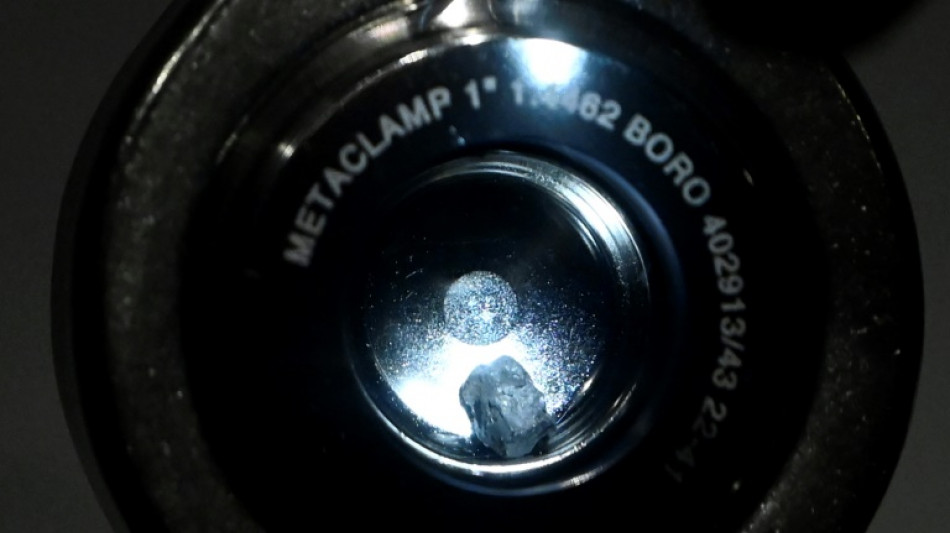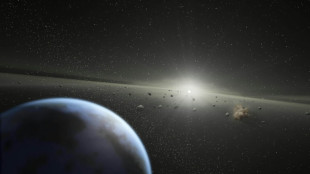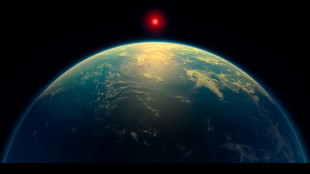
-
 Vance discusses migration during Vatican meeting with pope's right-hand man
Vance discusses migration during Vatican meeting with pope's right-hand man
-
Afghan FM tells Pakistan's top diplomat deportations are 'disappointment'

-
 British cycling icon Hoy and wife provide solace for each other's ills
British cycling icon Hoy and wife provide solace for each other's ills
-
Money, power, violence in high-stakes Philippine elections

-
 Iran, US hold second round of high-stakes nuclear talks in Rome
Iran, US hold second round of high-stakes nuclear talks in Rome
-
Japanese warships dock at Cambodia's Chinese-renovated naval base

-
 US Supreme Court pauses deportation of Venezuelans from Texas
US Supreme Court pauses deportation of Venezuelans from Texas
-
Pakistan foreign minister arrives in Kabul as Afghan deportations rise

-
 Heat and Grizzlies take final spots in the NBA playoffs
Heat and Grizzlies take final spots in the NBA playoffs
-
Iran, US to hold second round of high-stakes nuclear talks in Rome

-
 Humanoid robots stride into the future with world's first half-marathon
Humanoid robots stride into the future with world's first half-marathon
-
Migrant's expulsion puts Washington Salvadorans on edge

-
 Plan for expanded Muslim community triggers hope, fear in Texas
Plan for expanded Muslim community triggers hope, fear in Texas
-
Pakistan foreign minister due in Kabul as deportations rise

-
 White House touts Covid-19 'lab leak' theory on revamped site
White House touts Covid-19 'lab leak' theory on revamped site
-
Dodgers star Ohtani skips trip to Texas to await birth of first child

-
 US senator says El Salvador staged 'margarita' photo op
US senator says El Salvador staged 'margarita' photo op
-
Ford 'adjusts' some exports to China due to tariffs

-
 Thomas maintains two-shot lead at RBC Heritage
Thomas maintains two-shot lead at RBC Heritage
-
US to withdraw some 1,000 troops from Syria

-
 Four killed after spring storms wreak havoc in the Alps
Four killed after spring storms wreak havoc in the Alps
-
Spurs' Popovich reportedly home and well after 'medical incident'

-
 Trump goes to war with the Fed
Trump goes to war with the Fed
-
Celtics chase second straight NBA title in playoff field led by Thunder, Cavs

-
 White House site blames China for Covid-19 'lab leak'
White House site blames China for Covid-19 'lab leak'
-
Norris edges Piastri as McLaren top Jeddah practice

-
 Trump warns US could ditch Ukraine talks if no progress
Trump warns US could ditch Ukraine talks if no progress
-
Judge denies Sean 'Diddy' Combs push to delay trial

-
 80 killed in deadliest US attack on Yemen, Huthis say
80 killed in deadliest US attack on Yemen, Huthis say
-
Lebanon says two killed in Israeli strikes in south

-
 Trump says US will soon 'take a pass' if no Ukraine deal
Trump says US will soon 'take a pass' if no Ukraine deal
-
F1 success is 'like cooking' - Ferrari head chef Vasseur

-
 Cycling mulls slowing bikes to make road racing safer
Cycling mulls slowing bikes to make road racing safer
-
Macron invites foreign researchers to 'choose France'

-
 Klopp 'happy' in new job despite Real Madrid rumours: agent
Klopp 'happy' in new job despite Real Madrid rumours: agent
-
Alcaraz into Barcelona semis as defending champion Ruud exits

-
 Vance meets Italy's Meloni before Easter at the Vatican
Vance meets Italy's Meloni before Easter at the Vatican
-
Evenepoel returns with victory in Brabantse Pijl

-
 Maresca confident he will survive Chelsea slump
Maresca confident he will survive Chelsea slump
-
Mob beats to death man from persecuted Pakistan minority

-
 Lebanon says one killed in Israeli strike near Sidon
Lebanon says one killed in Israeli strike near Sidon
-
Arsenal's Havertz could return for Champions League final

-
 US officials split on Ukraine truce prospects
US officials split on Ukraine truce prospects
-
Client brain-dead after Paris cryotherapy session goes wrong

-
 Flick demands answers from La Liga for 'joke' schedule
Flick demands answers from La Liga for 'joke' schedule
-
'Maddest game' sums up Man Utd career for Maguire

-
 Trial opens for students, journalists over Istanbul protests
Trial opens for students, journalists over Istanbul protests
-
Gaza rescuers say Israeli strikes kill 24 after Hamas rejects truce proposal

-
 'Really stuck': Ukraine's EU accession drive stumbles
'Really stuck': Ukraine's EU accession drive stumbles
-
'Not the time to discuss future', says Alonso amid Real Madrid links


Life's 'basic building blocks' found in asteroid samples
Pristine samples of the asteroid Bennu transported to Earth contain the "basic building blocks" for life, shedding new light on the perennial question of how life began on our planet.
The revelation, in two studies published Wednesday, is the result of work on just 120 grams of material -- about the weight of a banana -- collected from Bennu by NASA's OSIRIS-REx spacecraft in 2020.
The samples from Bennu, then around 300 million kilometres (186 million miles) from Earth, were returned in a capsule that OSIRIS-REx dropped off during a pass-by in 2023.
Initial analysis had already revealed evidence of high-carbon content and water.
But the new research found that evaporated water on Bennu's parent asteroid left behind "the raw ingredients of life", said Tim McCoy, curator of meteorites at the Smithsonian's National Museum of Natural History and co-lead author of one of the studies.
"We have discovered that next step on a pathway to life," he said in a press release issued by the museum.
Bennu appears to have formed around 65 million years ago from the debris of a parent asteroid dating back some 4.5 billion years.
The findings suggest Bennu's parent was once home to pockets of liquid water. When these evaporated, they left behind a "briny broth" of salts and minerals.
Some of the minerals include compounds that have never been seen in samples from outer space, the museum said.
And analysis of the samples strongly suggests a "non-terrestrial origin", adds one of the studies.
That could lend support to the theory that life on Earth was seeded from outer space.
- 'Unprecedented insight' -
The samples "give unprecedented insight into the processes that drove the formation of the Solar System," according to Yasuhito Sekine, a professor at the Institute of Science Tokyo.
"This discovery was only possible by analysing samples that were collected directly from the asteroid then carefully preserved back on Earth," he added.
"The salts would otherwise have rapidly absorbed moisture in the Earth's humid atmosphere."
The researchers believe similar salty brines may exist on other extraterrestrial bodies, including the dwarf planet Ceres and Saturn's moon Enceladus, as well as other asteroids.
They plan to reexamine specimens already on Earth for traces of compounds that previous research might have missed.
"Even though asteroid Bennu has no life, the question is could other icy bodies harbour life?" said Nick Timms, an associate professor at Curtin University's School of Earth and Planetary Sciences also involved in the research.
Much about life's origin remains unclear despite the secrets revealed from Bennu, McCoy cautioned.
"We now know we have the basic building blocks to move along this pathway towards life, but we don't know how far along that pathway this environment could allow things to progress," he said.
Still, Sara Russell, co-lead author with McCoy and a cosmic mineralogist at the museum, said the research had made "huge progress in understanding how asteroids like Bennu evolved, and how they may have helped make the Earth habitable".
P.Keller--VB


